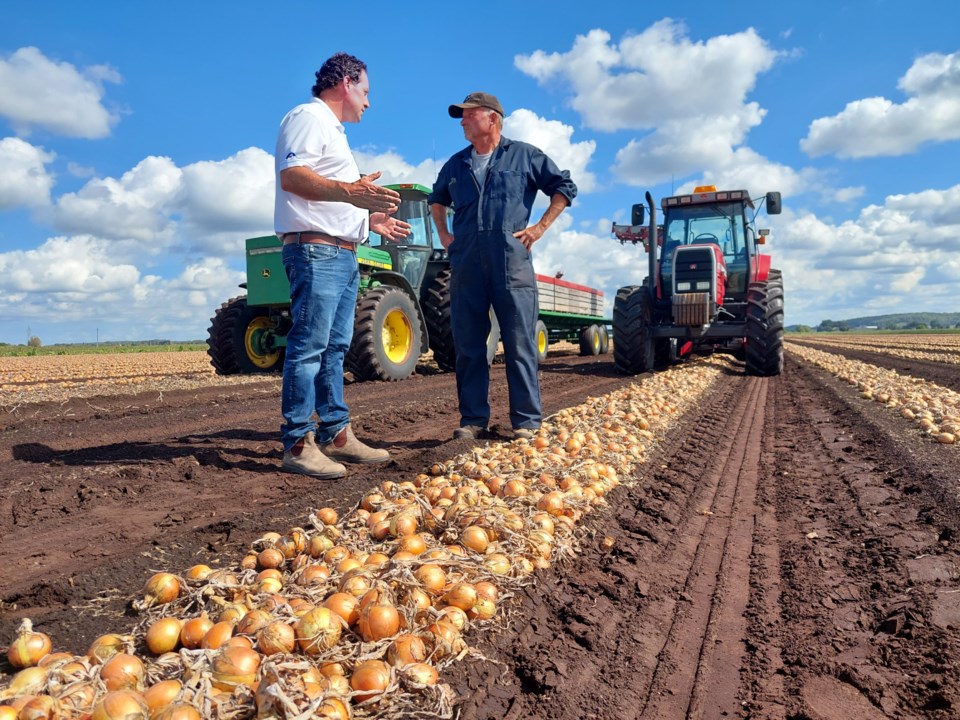An effort by York-Simcoe Conservative MP Scot Davidson to prevent produce profits from perishing is one step closer to becoming law.
Davidson’s private member’s bill, C-280, passed third reading in the House of Commons on Oct. 25, with overwhelming support of 320 MPs in favour and only one opposed. However, it still needs to pass second and third reading in the Senate before it receives royal assent.
The bill, also known as the Financial Protection for Fresh Fruit and Vegetable Farmers Act, aims to help sellers of fresh produce recoup some of their costs if buyers go bankrupt, by updating the Companies’ Creditors Arrangement Act and the Bankruptcy and Insolvency Act to require that perishable produce and proceeds of sale are held in trust, which gives farmers top priority among creditors.
“With this bill, Canada’s fruit and vegetable farmers will be paid for the food they grow. This common sense legislation will also lower produce costs for Canadians, and promote our country’s domestic food security,” Davidson said in a press release.
The local MP explained that since fresh fruit and vegetables are highly perishable and have a limited shelf-life, when buyers of fresh produce become insolvent, unpaid shipments cannot be repossessed and resold, because usually there is no longer any salvageable product left.
As a result, Davidson notes Canadian farmers are often at risk of not being paid, leading to farm bankruptcies and worsening Canada’s food security.
Dominion Farm Produce has been in operation since 1964 and is well-known in Bradford as a grower, packer and shipper of produce including carrots, parsnips, onions and red beets.
These days they mostly deal with major grocery chains, who seem unlikely to go bankrupt; however, Tony Tomizza, vice-president and general manager, still appreciates the value of the bill, especially for newer, smaller producers.
“At Dominion’s end we’ve been pretty lucky to develop a group of customers we can trust, but it has happened,” he said, noting that about 20 years ago, the company lost roughly $50,000 US when a purchaser couldn’t pay.
While Tomizza has seen some smaller wholesalers in Ontario go bankrupt, he noted the risk from American purchasers is usually greater.
“They can go Chapter 11 pretty quickly without any notice,” he said. “We do a lot of business in (the United States), but we have solid customers.”
The Canadian Federation of Agriculture was “thrilled” to see the bill pass, according to president Keith Currie.
“As a farmer, you grow your product all year then you sell it once, and when it’s sold and you don’t get paid for it, there’s your income for the year potentially gone, especially if you’re selling the bulk of your product to one company,” he said. “This is a big win for horticulture in particular to ensure there’s going to be some financial remuneration there if the company goes bankrupt.”
The federation lobbied for and supported the bill and plan to continue lobbying the Senate by working closely with the Fruit and Vegetable Growers of Canada and the Canadian Produce Marketing Association.
Currie suspects Ontario Senator Rob Black, who chairs the agriculture and forestry committee, will support the bill.
Davidson also touts the bill’s larger financial benefits to the economy, citing statistics from a 2019 report by RIAS (Regulatory Impacts Analysis Strategies).
The report claims efforts like C-280 would reduce losses in the sector and lead to increased economic activity in Canada of between $200 million to $235 million per year, added value into the Canadian economy of $104 million to $122 million annually, increased employment by more than 1,200 full-time jobs, and better wages for Canadian workers by a total of $59 million to $69 million per year.
The report found it would also lead to a reduction in costs for Canadian consumers purchasing fresh produce imported from America by five to 15 per cent, saving Canadian families between $300 million and $900 million on their annual fresh fruit and vegetable purchases.
Davidson also notes the bill’s potential to restore preferential treatment for Canadian producers selling produce south of the border under America's Perishable Agriculture Commodities Act (PACA).
Currently, Canadian sellers must post a bond worth double the value of their shipment just to initiate a claim through PACA.
However, Patrick Speck, director of operations for Davidson, said their office has received written confirmation from Bruce Summers, administrator for the United States Department of Agriculture’s Agricultural Marketing Service that as far as he’s seen, the bill it would satisfy the final of four main requirements to restore reciprocity under PACA.
Passing the bill here in Canada wouldn’t guarantee changes to PACA, but it should help that process to get underway.
The full text of the bill along with a summary and vote results can be found on the Parliament of Canada website.
